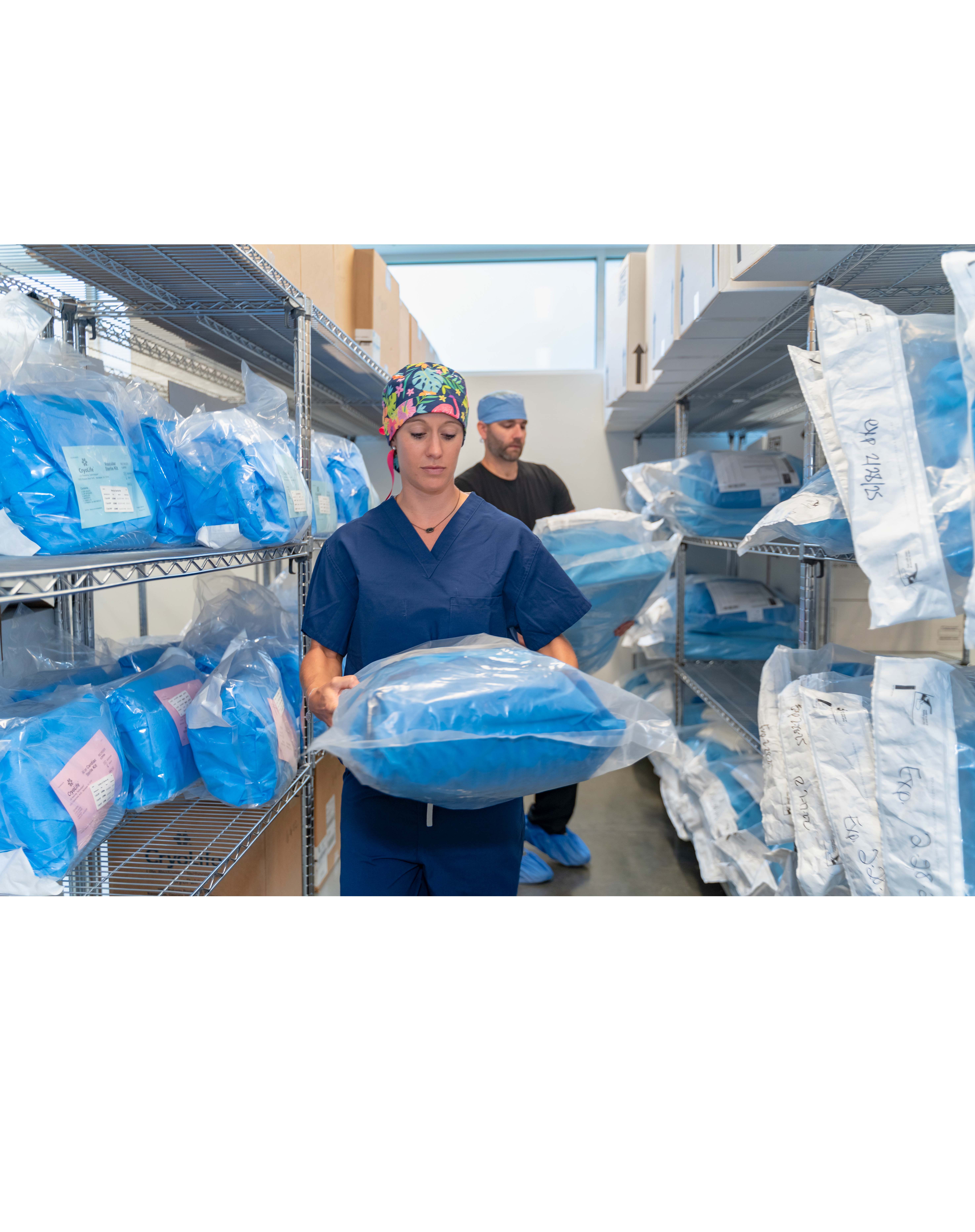Arora Makeover: Ohio Transplant Sparks Life-Changing Transformation At Arkansas’ Largest Organ Donation Group
October 10-16, 2022
By Wesley Brown
The past 12-month period since Arkansas Regional Organ Recovery Agency (ARORA) landed on the list of the worst-run organ procurement organizations (OPO) may turn out to be the most crucial 365-day stretch in the agency’s history.
Over the past year, the Arkansas OPO known locally only as ARORA has moved into a brand-new, state-of-the-art midtown headquarters, revamped its entire operations and staff, and hired a new CEO in January. That executive has sparked a remarkable turnaround in the agency’s performance that is gaining national attention.
Formerly senior director of OPO operations at LifeNet Health in Virginia Beach, Va., Ohio native Mark Tudor came to ARORA with over 30 years of broad experience across the organ donation and transplant industry. Tudor became president of the Association of Multicultural Affairs in Transplantation (AMAT) in October 2021, about the same time ARORA received the news that it was among the worst performing OPOs in the nation. Founded in 1991, AMAT supports minority transplant and procurement professionals that play a critical role in the nation’s dollar transplant system.
Despite Tudor’s bona fides, few people in the nation’s organ donation community thought ARORA would survive after the U.S. Centers for Medicare and Medicaid (CMS) report a year ago offered a grave assessment of the agency’s operations. Entering 2021, former ARORA CEO Alan Cochran had also announced plans to retire at year’s end, only months before the Biden administration unveiled new rules on how OPOs procure life-saving hearts, kidneys, lungs, pancreas, livers and intestines.
According to new outcome measures for OPO performance that went into effect on March 30, 2021, CMS reported that ARORA’s donation rate for deceased organ donors was dead last out of the 57 federally mandated OPOs in the U.S. At the same time, the Little Rock-based OPO’s standard transplantation rate for candidates on the state’s organ donor waitlist was also third-to-last among the same OPOs.
Although Cochran refused to acknowledge any problems concerning ARORA’s performance publicly, CMS in October 2021 put the Arkansas organ procurer and other low-performing OPOs on the clock to quickly improve its dismal organ donation and transplant rates. After handing down new reforms in early 2022, OPOs will now be held accountable for the new standards for recertification purposes in 2026.
A year ago, ARORA was facing the possibility of being the first federally mandated OPO in the U.S. to be decertified. That meant that the Biden administration and CMS could pull the Little Rock nonprofit’s oversight responsibility for the agency’s donor service area (DSA) that stretches across 64 of the state’s 75 counties.
Nationally, all 57 OPOs in the U.S. are nonprofit organizations responsible for procuring organs for transplantation. They are legally permitted to recover organs from deceased donors and support donor families, manage clinical management of organ donors, and provide professional and public education about organ donation.
ARORA’s Challenge
Following a late 2020 consultant’s report that criticized Cochran and ARORA’s clinical staff for the agency’s organ recovery policy that contributed to an increase in discards and organs not being used, a top executive at a neighboring OPO was adamant that CMS should decertify ARORA. The other alternative was for the Arkansas OPO to merge or be acquired by one of the other 56 OPOs.
“Arkansas’ [organ donation] data shows they recovered 57 livers on 65 donors in 2019. WTF. We now know their recovery criteria — only pursue if the liver [or organ] is good. How is that not malfeasance?” asked a top OPO executive in Missouri, according to emails obtained by The Daily Record from an ongoing congressional subcommittee investigation of the OPO industry.
Kevin Cmunt, the former CEO of Itasca, Ill.-based Gift of Life Organ and Tissue Donor Network, offered an even stronger rebuttal of ARORA’s past reputation across the national organ donation community, which spans all 50 states. During his eight-year tenure with Gift of Life, Cmunt managed a staff of nearly 400 employees that worked with over 180 hospitals and transplant centers and served more than 12 million people in the agency’s federally designated DSA, including the Chicago area, most of Illinois and parts of northwest Indiana.
Under the new organ donation reform rules introduced in President Donald Trump’s executive order in July 2019, Cmunt said the Biden administration is now holding OPOs accountable for inferior performance under a new, more transparent rating system. Based on CMS’ new three-tier rating system, ARORA learned in late 2021 that it would need to increase its donation and transplantation rates by more than 50% to meet the new OPO reform standards.
Under the new reform rules, ARORA would need to increase its organ donation rate by 37 persons annually heading into 2021, which was more than half the Arkansas OPO’s annual average over the past decade. The number of deceased donors recovered in ARORA’s DSA was 58 and 61 in 2019 and 2020, respectively.
Concerning ARORA’s transplant rate for those registered candidates needing a life-saving organ, ARORA would need a whopping 96 additional transplants to reach so-called Tier 1 status. The Little Rock-based nonprofit saw 192 transplants in 2019 and 204 in 2020.
“These eight are at the most serious risk,” CMS officials said a year ago in the 217-page narrative highlighting the new OPO reforms.
As the former CEO of one of the nation’s top performing OPOs, Cmunt called the national reforms by the Biden administration “rearview mirror stuff,” noting that most OPOs are focused on day-to-day operations and helping save lives.
“We never paid much attention to that stuff because, to be honest, we were not in fear of being out of compliance with anything. And what drove us, and we had pretty good success in improving [organ] donations, was the mission. And we were very competitive — and that helps a lot,” Cmunt said.
Despite the metrics highlighted in the CMS report, the retired OPO executive said the one common thread in the dramatic improvement of failing Tier 2 and Tier 3 OPOs in 2022 is new leadership, including ARORA.
“And I will be honest; I used to use ARORA as an example of an OPO that should not be in business because Arkansas was at the bottom of the list for OPOs, no matter what metric you used,” Cmunt told The Daily Record. “You know at 65 donors a year, donors per million, conversion rate, or blah, blah blah, it didn’t make any difference. [ARORA] just wasn’t performing all that well, and Mark [Tudor] proved me wrong.”
ARORA’s Transformation
Indeed, since ARORA’s board of directors hired Tudor following an exhaustive national search in late 2021, things have swiftly changed since he joined the agency in January and immediately began implementing agency-wide changes. As noted by Cmunt, the number of deceased donors recovered in ARORA’s DSA in 2019 and 2020 was an unremarkable 64 and 63 total.
At the end of 2021, ARORA’s performance spiked by a robust 59% to 101 donors. Through the first half of 2022, ARORA is already at 91 organ donors and expects to end the year at 156. CMS data shows that that is the most significant improvement among all 57 OPOs in the U.S. and the highest tally of organ donors ever in the agency’s history.
Concerning ARORA’s transplant rate for those registered candidates needing a life-saving organ, ARORA needed a whopping 96 additional procedures to reach Tier 1 status, based on 2019 data. The Little Rock-based nonprofit saw 212 and 218 transplants in 2019 and 2020, respectively, but improved substantially to Tier 2 level in 2021. With 195 transplants through the first half of 2022 and a projected 334 by the end of the year, ARORA would be just one transplant short of Tier 1 status.
“Clearly, there is nothing wrong with [ARORA’s] donor service area. It can be highly successful,” said Cmunt. “I am pretty confident they will be a Tier 1 agency by the current measures [next year].”
Through the first half of 2022, Tudor said during a wide-ranging interview with The Daily Record at ARORA’s brand-new $6 million headquarters that the Arkansas OPO today is solidly a Tier 2 organ donation agency. For those seeking a transplant of a life-saving heart, kidney, liver, lung or pancreas, ARORA’s improvement is a minor miracle as more lives than ever are being saved through the agency’s efforts and the support of local transplant partners, including UAMS, Arkansas Baptist Health, and Arkansas Children’s Hospital.
“We have made tremendous thrives. Being a Tier 3 OPO was a scary position,” Tudor said. “With me coming here as a CEO, I said, ‘Do I want to go to an OPO that is a Tier 1.’ I was working at two Tier 1 [agencies]. It was a big leap to come here, but I wanted to do what was best, and I thought I could implement changes to get us here. And that’s why I came.”
Regarding ARORA’s survival, Tudor said his first nine months on the job have primarily focused on improving the agency’s circulatory death (DCD) rates once a person dies and is eligible for organ donation. He admitted that ARORA had a “wait-and-see attitude” where the agency’s clinical staff chose to pursue only perfect organ donor candidates. That view is consistent with a national consultant’s review of ARORA’s operations under Cochran and three other CEOs going back over the past decade.
“First, we had to change the culture,” said Tudor. “I think there was a culture of ‘rule out’ mentality. We had to change that to ensure every organ donor referral is a ‘rule in.’ And we need to take that approach every time we have an opportunity, regardless of how medically complex a patient is. Some of our patients are very, very sick and some may not qualify to be an organ donor — but that’s not for us to decide.”
Among many of the ongoing changes at ARORA, both Tudor and Cmunt mentioned ARORA’s participation in the first and second phases of the Organ and Procurement and Transplantation Network’s (UNOS) DCD Procurement Collaborative project. UNOS is the federal contractor approved by Congress that oversees many aspects of the organ and transplant process in the U.S. The quasi-federal agency also manages the nation’s organ donation waiting list, which now stands at 105,786 U.S. residents needing a life-saving transplant.
The UNOS-led project involves more than 30 OPOs across the U.S. that are working to identify and share effective practices related to donations of life-saving organs after DCD). “The OPOs participating in this collaborative have the opportunity to learn from each other and hear how other OPOs combat similar challenges,” said Kate Breitbeil, UNOS performance improvement specialist.
In his new role as AMAT president and one of the nation’s top DE&I advocates in the organ donation industry, Tudor admitted that ARORA and all OPOs have a long way to go in providing better care and access to African Americans and other minorities. He noted that Arkansas has no lung or pancreas transplant program and only one heart transplant program in the state.
“So, if you are someone in Arkansas, you have to travel outside the state of Arkansas just to find that type of care, and a lot of people can’t afford it,” he said. “First of all, they can’t afford it financially, and they can’t afford the social aspect of going to the transplant center and [having] no support system. It’s just not a fair system, and it is not equitable for everyone.”
Tudor also noted that Black people are most likely to die or need an organ transplant due to kidney failure but generally are not educated about kidney transplants until after dialysis. In addition to improving organ and donation transplantation rates for Black people and other minorities in Arkansas, Tudor said he had made management and staff changes that reflect the growing diversity of the local population.
Going back for more than a decade, ARORA has also faced allegations of racial discrimination and high turnover among Black employees. Several current and former employees and board members have also linked the agency’s inferior performance under Cochran and other past ARORA CEOs and managers.
Only weeks after Cochran took office in late 2014, the agency’s former CFO Felicia Bowman filed a racial discrimination lawsuit in federal and local courts alleging a long-held culture of systemic bias and lack of promotions for Black employees at ARORA. Cochran responded by demoting and firing the agency’s lone top Black executive, who later lost her lawsuit before a Pulaski County jury in October 2017.
Tudor said he recently sent two employees to a DE&I training retreat over the summer and is considering whether to hire a diversity and equity specialist for the agency’s staff. As those changes are underway, the Michigan native said he hopes to share ARORA’s DE&I success stories with other OPOs to testify to the necessity of diversity and equity for the industry’s success.
“At some point, we want to present our plan for the DE&I initiative and let [people] know how we did that. We know that we had nothing, minimal at ARORA,” said the new AMAT president. “I hope by this time in two years, we are a model for the industry.”
ARORA’s Rebrand
Meanwhile, as ARORA undergoes its internal heart transplant, the agency is also getting a transformative facelift with a recent rebrand and relocation to a new headquarters in west Little Rock. Tudor said that the new state-of-the-art offices at 1300 Wilson Road would enhance the agency’s operations and clinical services for many years.
According to blueprints of the 19,000 square foot healthcare facility and offices, ARORA invested just over $6 million to purchase the land and build a new recovery center and headquarters. The new location also provides two operating room suites to allow for simultaneous tissue recoveries to ensure the agency’s ability to honor every gift.
“Following an initial investment, we tailored our loan, so the monthly payments are equal to our previous lease agreement,” said Tudor.
The new facility also enables ARORA to host local community events, such as donor family and transplant recipient meetings. “We now can host our hospital partners when working on collaborative projects. We are also making our conference spaces available to the community as gathering locations,” he said. “Our new location has provided our staff a heightened level of security — an important improvement since ARORA functions 24/7. And lastly, we now have an environment expressly designed to enable and cultivate our mission, which leads to increased workplace satisfaction and improved morale.”
Concerning ARORA’s transformation, agency Board Chairman Seth Heldenbrand has served on the board of the Arkansas OPO for nearly a decade and spearheaded the national search that landed Tudor. While silent about the agency’s past performance, he applauded the hiring of the OPO veteran.
“I can for sure say that Mark has been a true blessing for ARORA, and he has done exactly what we asked of him upon hire,” said Heldenbrand, associate dean of experiential education at the UAMS College of Pharmacy. “He has been able to use his clinical experience to expand our organs recovered and transplanted and been able to implement new programs in line with our mission of saving and restoring lives.”
Photo Captions:
1. ARORA recently moved into its new $6 million, 19,000 square foot, state-of-the-art headquarters in west Little Rock. Arkansas’ largest OPO employs over 90 workers and serves 64 of the state’s 75 counties. In the federally mandated nonprofit’s 990 financial statements with the IRS, ARORA reported annual revenue of nearly $15 million and a net surplus exceeding $16.7 million.
2. ARORA tissue recovery team members pull supplies required in the process of recovering life-restoring tissues for transplant. The new facility includes two tissue recovery suites, doubling the onsite capacity to ensure every gift of life can be recognized.
3. Director of Family Services Esther Pipkin confers with ARORA CEO Mark Tudor in his office at the agency’s new facility on Wilson Road in west Little Rock.
4. One of the ARORA-branded vehicles provided by NORA — Nationwide Organ Recovery Transport Alliance — staff to deliver transportation services for tissue recovery.
5. Manager of Human Resources Melanie Browning presenting to colleagues in one of the new facility’s tech-enabled conference facilities; several of these rooms are being made available to community groups for meetings.







